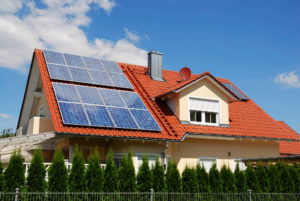Solar energy emerges as a beacon of hope in an era increasingly conscious of environmental sustainability. This article delves into the transformative power of solar energy. This renewable resource stands out for its ability to generate electricity without the detrimental effects of traditional power sources. We explore how solar panels, a marvel of modern technology, efficiently convert sunlight into electrical energy, offering a green alternative that benefits our planet and our pockets. From drastically reducing greenhouse gas emissions to creating job opportunities and saving on energy bills, the advantages of solar power are multifaceted and far-reaching. As we navigate these insights, you’ll discover why solar energy is not just an option but a necessity for a sustainable future.
Contents
- 1 Key Takeaways
- 2 What Is Solar Energy?
- 3 The Benefits of Solar Power on The Environment
- 4 The Benefit of Solar Panels
- 5 Case Study: The Environmental Impact of Residential Solar Panel Installation
- 6 Expert Insights From Our Solar Panel Installers About the Environmental Benefits of Solar Energy
- 7 Experience Solar Excellence with Us!
- 8 To Conclude With
Key Takeaways
- Solar energy is a clean and renewable power source that reduces greenhouse gas emissions and air pollution, making it environmentally friendly.
- Solar power significantly decreases dependence on fossil fuels, reducing carbon footprint and lowering air and water pollution compared to conventional energy sources.
- Solar panels are a vital component of solar technologies, efficiently harnessing the sun’s energy, purifying the air, and contributing to a more sustainable future while offering cost-effective solutions.
What Is Solar Energy?
Ideally, this energy source is renewable and free to use. You can swiftly harness it through a device called the solar panel. Unlike in thermal power plants, producing this energy is easy. Residents can do it from their backyard or roof.
According to science, it is the conversion of light to electrical energy. Moreover, solar power does not produce greenhouse gases, making it environmentally friendly.
In short, you can generate electricity from the sun using panels without worrying about solar radiation.
You need photovoltaic or solar cells if you are ready to convert sunlight into pure electrical power. You can utilize this energy to power your vehicles, commercial buildings, streetlights, homes, etc. In the United States, this industry also created various diversified job opportunities.
With this, you can improve your home’s electrical efficiency while saving much money.

The Benefits of Solar Power on The Environment
Solar technologies do not compromise natural gas emissions or produce air pollutants. All it does is utilize the sun’s energy to generate electricity through solar systems. Moreover, reducing your electricity bills also helps the environment stay young and habitable.
It can also help fight climate change and reduce dependence on non-renewable natural resources. So, here is a breakdown of the main benefits to help you understand the energy produced by solar technologies.
Reduced Dependence on Fossil Fuels that Eradicates Carbon Footprint
The overall positive impact of any solar energy system on the world stems from reducing fossil fuel usage. This energy requires sunlight to generate electricity.
With this power, you can eradicate the production of toxic gases like carbon dioxide, methane, etc. Hence, it reduces air pollutants and the intensity of greenhouse gas emissions. As an American, you can go solar to decrease the fossil fuel demands and withdraw the carbon footprint.
In short, solar energy is the cleanest source that does not require burning natural gas in power plants.
Reduced Air Pollution and Water Usage
Using conventional sources like fossil fuel to produce power can generate air pollutants. At the same time, other sources utilize water to generate electricity. Both of these could dramatically decrease the air quality and reduce water resources.
However, solar power only requires the sun to operate using solar panels. No solar technologies need air or water to generate the necessary power. So, with this, you can say goodbye to climate changes, global temperature rise, and contamination of river and lake waters.
It is indeed renewable energy that makes the air cleaner, which gives humans healthy lungs. Cleaner air owing to solar power can save 25,000+ lives.

The Benefit of Solar Panels
Solar panels are one of the most sought-after solar technologies and the mother of all renewable energy-generating machines. These devices have solar cells that harness the sun’s heat. Consequently, it converts that into electrical energy, which can power any home in the United States.
Besides, over the last ten years, the production and use of solar power have grown due to these devices. Most of the environmental benefits mentioned earlier stem from using solar panels.
Not only are they powerful enough to produce renewable energy technology, but they also contribute to the earth’s well-being.
At the same time, solar panels have similar long-term benefits. For example, it can purify your air while efficiently conserving more water.
You can also use these panels to help solve climate change by lowering carbon emissions.
Apart from these, solar systems are known to be cost-effective and considered a secure investment. It saves you a lot of electricity bills and gives you unlimited access to energy. Moreover, solar panel installation in the United States also gets government incentives.
Fun Fact: Coal, gas, and oil will last till 2090, 2060, and 2052 respectively.

Case Study: The Environmental Impact of Residential Solar Panel Installation
Background
At Solar Panels Network USA, we are dedicated to promoting sustainable energy solutions. This case study illustrates the environmental benefits of installing solar panels on a residential property, demonstrating how solar energy can significantly reduce the carbon footprint and promote cleaner air.
Project Overview
Our client, a homeowner in a suburban neighborhood, sought to reduce their carbon footprint and lower their energy bills by installing solar panels. The goal was to harness solar energy efficiently and contribute to environmental sustainability.
Implementation
Site Assessment and Preparation
We began with a thorough site assessment, evaluating the roof’s exposure to sunlight, potential shading from nearby trees, and the overall condition of the roof. This step was crucial to ensuring the optimal placement and efficiency of the solar panels.
System Design and Installation
Based on the assessment, we designed a solar panel system tailored to the client’s energy needs. We selected high-efficiency photovoltaic panels known for their durability and performance. The installation process involved:
- Securing the mounting hardware to the roof.
- Installing the solar panels and connecting them to the home’s electrical system.
- Setting up an inverter to convert the solar energy into usable electricity.
Compliance and Safety Checks
We ensured the installation complied with local regulations and safety standards. This included obtaining necessary permits and conducting a final inspection to verify the system’s integrity and functionality.
Results
Environmental Impact
The installed solar panels significantly reduced the homeowner’s reliance on fossil fuels. By generating clean, renewable energy, the system decreased the household’s carbon dioxide emissions by approximately 4,000 pounds annually. This reduction in greenhouse gases contributes to better air quality and a healthier environment.
Energy Savings
The solar panel system generated an average of 6,000 kWh of electricity per year, covering about 80% of the homeowner’s energy needs. This resulted in substantial savings on their electricity bills, with an estimated annual reduction of $1,200.
Long-Term Benefits
In addition to immediate energy savings, the solar panels are expected to last for over 25 years, providing long-term environmental and financial benefits. The homeowner also took advantage of federal and state incentives, further offsetting the installation costs.
Summary
This case study highlights the transformative impact of residential solar panel installations on the environment. By harnessing solar energy, the homeowner reduced their carbon footprint, improved air quality, and achieved significant energy savings. At Solar Panels Network USA, we are committed to delivering sustainable energy solutions that benefit both our clients and the planet.
Expert Insights From Our Solar Panel Installers About the Environmental Benefits of Solar Energy
Solar energy is not only a renewable resource but also a solution that significantly reduces greenhouse gas emissions, helping us combat climate change effectively.
Senior Solar Panel Installer
Installing solar panels on your home can drastically cut your electricity bills while contributing to a cleaner, healthier environment by reducing air pollution.
Lead Solar Engineer
Using solar energy helps decrease our reliance on fossil fuels, making it a sustainable choice for both the planet and your pocket.
Chief Installation Officer
Experience Solar Excellence with Us!
Trust in Solar Panels Network USA, where our seasoned experts deliver top-quality solar solutions for homes and businesses nationwide. With a legacy of countless successful installations and a commitment to sustainable energy, we’re your reliable partner in the solar journey. Ready for a brighter, eco-friendly future? Call us now at (855) 427-0058 and harness the sun’s power!
To Conclude With
Now you know all about the unique environmental benefits of solar energy. Indeed, you can reduce your carbon footprint and carbon dioxide production using solar power. In addition, it also reduces the production of greenhouse gases and efficiently generates electricity.
With the help of proper solar technologies, you can convert sunlight into energy. Besides, this renewable energy does not require fossil fuels to power your United States home.
In short, solar energy is an excellent alternative to conventional power because of its cost-effectiveness, versatility, and government incentives. So, you can now choose your solar energy technology after analyzing the kilowatt hours required for your home.
This way, you will no longer contribute to the air pollutants and reduce overall water usage.
About the Author
Solar Panels Network USA stands at the forefront of solar energy solutions, driven by a team of seasoned solar engineers and energy consultants. With over decades of experience in delivering high-quality solar installations and maintenance, we are committed to promoting sustainable energy through customer-centric, tailored solutions. Our articles reflect this commitment, crafted collaboratively by experts to provide accurate, up-to-date insights into solar technology, ensuring our readers are well-informed and empowered in their solar energy decisions.

